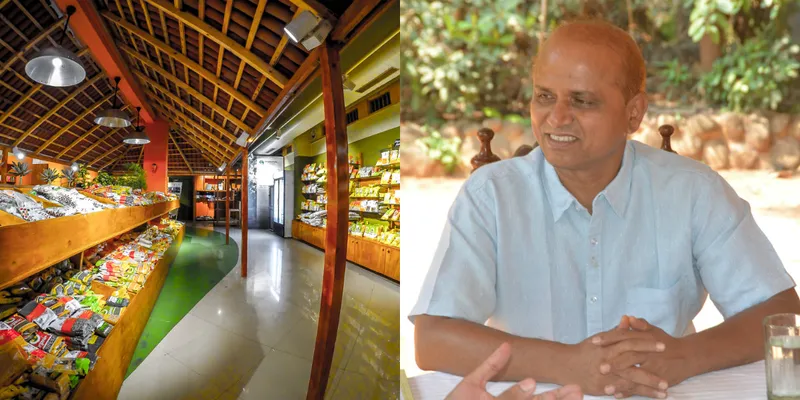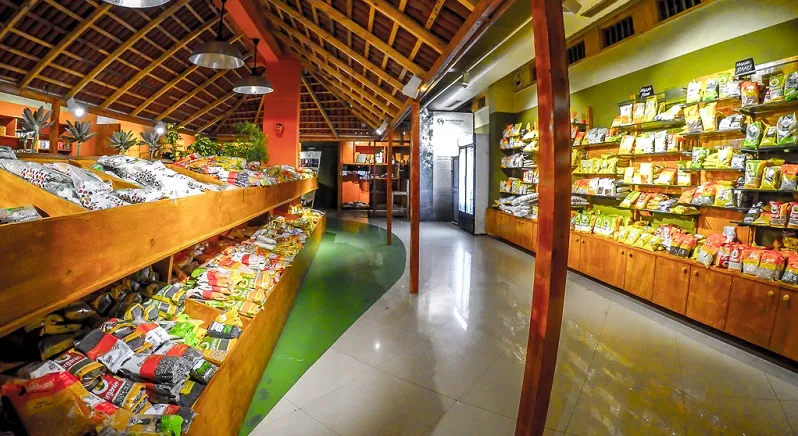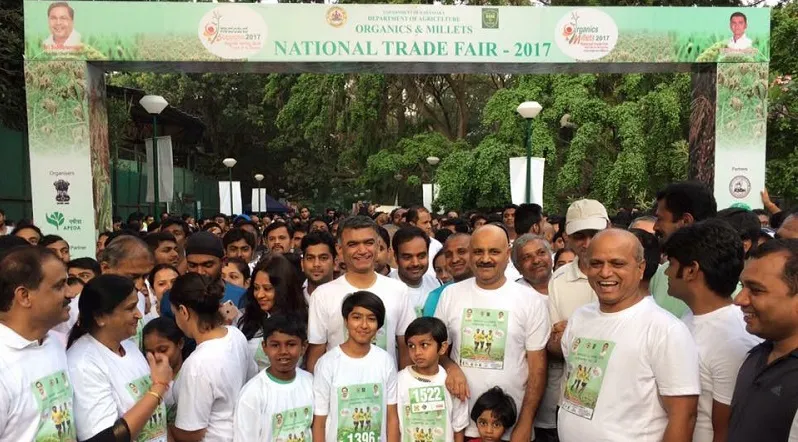Meet lawyer-turned-farmer who is raising the bar for healthy living
After 34 years of practice in law, Jayaram turned his passion for organic farming through four different ventures. With an organic farm in Nelamangala, a retail store and restaurant in Bengaluru and a homestay in Coorg, the 68- year-old is turning organic farming as a new promenade for 'forgotten food'.
Though located in the heart of Bengaluru, The Green Path Eco Restaurant firmly shuts its doors on the hustle-bustle of city life and establishes a Zen atmosphere. Its calming interiors, shaped by recycled furniture, indoor plants, and shelves lined with millets for sale is an oasis. I notice the three-storey building mysteriously manages to remain cool in the unforgiving summer, despite having no air conditioner. As I quickly grab a cup of tea and look around, a gentleman in his late sixties welcomes me with a smile.
I notice the three-storey building mysteriously manages to remain cool in the unforgiving summer, despite having no air conditioner. As I quickly grab a cup of tea and look around, a gentleman in his late 60s welcomes me with a smile.
Lawyer-turned-organic farmer Jayaram, who was once known for filing the highest number of motor cases in the State of Karnataka, is today a flag-bearer of organic farming. After 34 years of practising law, today, he owns an organic farm in Nelamangala, a retail store, a restaurant serving and selling organic food in the city, as well as a retreat homestay in Coorg.

Small town boy
Hailing from a small village on the borders of Tamil Nadu and Karnataka, Jayaram did not have an easy childhood. His parents, who belonged to different castes, eloped and were cast aside by their families. Jayaram and his two younger brothers grew up without any interaction with extended family. They would help their parents with farming. This was the early memory that inspired Jayaram to lean towards farming later in life too. Recalls Jayaram,
Despite the difficult conditions, my mother was very particular that we were educated well, so she enrolled us in nearby government schools.
His early schooling was in his own village, but he was shifted to a school in the outskirts of his village when his parents saw potential in him. But the future of a boy who hailed from a family that was not accepted by society was far from clear. So, in order to infuse social acceptance into his family, Jayaram decided to move to Bengaluru to pursue his college education.
Finding identity in a city
In 1972, when young Jayaram moved to the city, he stayed at a community hostel. The space also offered him boarding and lodging and took care of his meals as well. He adds,
We had to pay a yearly fee of Rs 55, which was a big amount back then. The college principal was so impressed by my marks and the journey I had had, that he insisted I pursue a mainstream career. So I took up law in Renukacharya College. This also meant that I could then raise my voice against all the caste oppressions and setbacks that families like mine go through.
Jayaram began his career assisting lawyers who had a legacy of successful cases. After being mentored by them, he eventually went on to starting his own firm and became a leading lawyer in the city for motor cases. Smiles Jayaram,
At one point, I had 30 lawyers working under me. I had a successful career in law.
The drift
The early success in his career meant financial stability, but Jayaram could not rest just yet.
In 1998, he took a bold career decision and quit his practice. He purchased an eight-acre plot in Nelamangala, which was then a eucalyptus grove. He cleared the entire space and converted the barren land into a space suitable for farming. Jayaram explains,
We started with jowar and bajra. Though we initially used chemicals to grow them, it wasn’t too long before we realised that organic farming was just a step away. When my parents were into farming, none of these chemicals existed, so the shift wasn’t major for me.
Today, the same barren area has converted itself into a 40-acre full-fledged farm, with an artificial lake and a diary farm, employing 15 local farmers.
The farm also houses a biogas plant where all the animal waste is converted into manure.
He adds,
We want to make Bengaluru the organic capital of India. Through my project, I want to create more and more leaders and not followers; only then the society will change.
How does the market play out?
Today’s India is looking for alternatives to unhealthy food since lifestyle diseases have been on the rise. There is a demand for healthy food, but the bridge between consumers and the market is yet to pan out, and this is where companies like The Green Path establish their existence. They act as a catalyst in connecting the farmers and the buyers.

The Green Path’s retail store works with a lot of small-scale organic farmers and is a distributing unit for them. On entering the digital market, Jayaram says,
We are yet to explore the online market but we are working on a repository of active consumers who are more accessible considering we have a time constraint while dealing with fresh harvest.
The Green Path
The firm also promotes organic tours in the country that leads to helping people replicate the same model as theirs. The majority of these tourists are from Sweden, Germany, and the UK, Jayaram adds.
He lists out the benefits of organic farming for people who may be interested:
- Organic farming is a low-investment-high return profile
- Healthy forms of agriculture is actively promoted at every stage
- Soil is replenished, and land damage is reduced compared to existing forms of farming
- This farming type requires less water and yields more
- Since organic food is in demand these days, one is assured of doing well with farming.

Landmarks on the path
With a Rs 6-crore annual revenue, The Green Path today employs over 200 employees in all its four outlets (farm, retail store, restaurant, and a resort). Of these four different projects, the restaurant, which is only a year old has also gone on to win awards.

On the government's role in promoting the organic sector, Jayaram explains,
As of now there is no policy to help the organic sector, but we are hopeful. Indian agriculture is the future of our country, but, unfortunately, farmers have not been well supported in the country. This is one of the reasons why farmers in India are committing suicide, or are looking for alternative careers.
On a parting note, Jayaram adds that he will count himself successful only when he is able to reach his message of organic consumption, and influence people from all economic backgrounds to eat healthier.
The National Trade Fair – Organics & Millets 2017 -- is being organised by the Department of Agriculture, Govt. of Karnataka, Karnataka State Agricultural Produce Processing and Export Corporation Limited (KAPPEC), State Agricultural Universities and Jaivik Krishik Society on April 28-30. For more details log here.







